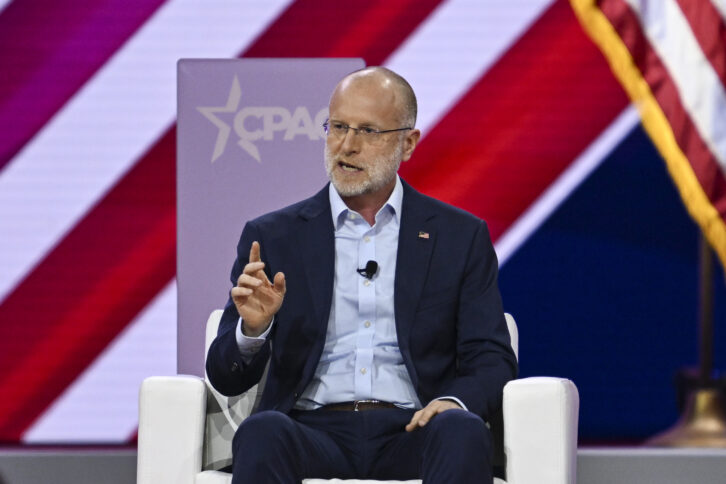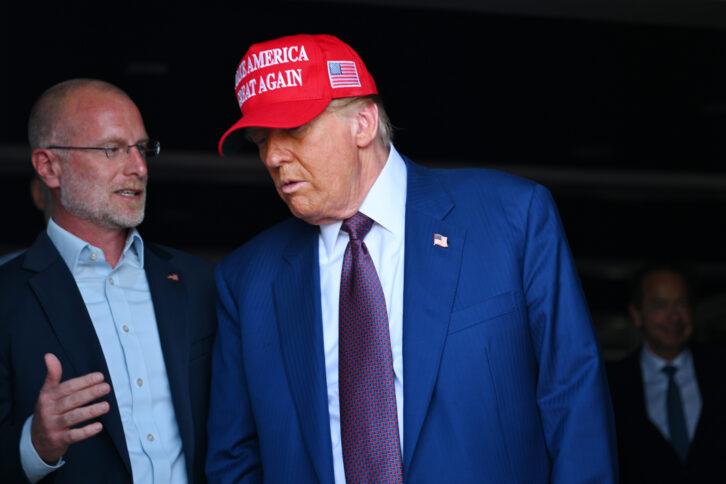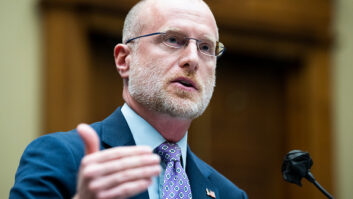Broadcast regulatory experts expect “fast and furious” changes at the Federal Communications Commission with Donald Trump’s return to the Oval Office.
The transition to Republican leadership at the FCC started with the announcement that Brendan Carr will ascend to the chairmanship.

Carr began spelling out his agenda in interviews and social media posts. He has been a vocal critic of social platforms for what he believes is unbalanced limitations on conservative voices. He immediately called out Big Tech, saying “it’s time to dismantle the censorship cartel.”
He promises to roll back government regulations. “Democrats have been in charge of the Administrative State — the alphabet soup of agencies in D.C. — for at least 12 of the last 16 years,” he said. “Over those 12 years, government control has increased and your freedoms have decreased. It is time to flip the script in Washington.”
He also plans to shut down the FCC’s own diversity, equity and inclusion programs.
“The FCC’s most recent budget request said that promoting DEI was the agency’s second highest strategic goal,” Carr wrote in a post on X days after the president-elect announced his intention to elevate him to the chair. “Starting next year, the FCC will end its promotion of DEI.”
Chairwoman Jessica Rosenworcel, the first woman to lead the agency in more than an acting capacity, announced she will depart the FCC on Jan. 20.
[Related: “Rosenworcel Lists Her Highlights of 2024”]
The five-member commission under President Biden has consisted of three Democratic and two Republican members. Carr was named to the FCC by then-President Trump in 2017.
The NAB was complimentary of the chairman-designate in a statement in November:
“Commissioner Carr has been a steadfast leader in holding Big Tech accountable and supporting policies that will allow local broadcast stations to better compete with these behemoths and thrive,” the association said in a press release.
However, in several media interviews, Carr also has said that he plans to scrutinize broadcast TV operators to see if they are operating in “the public interest,” and said they could lose their licenses if not.
Trump and Carr both were critical before the election of how some major national networks and programs covered presidential candidate Kamala Harris. But according to Business Insider, Carr emphasized that his comments about public interest obligations did not mean the FCC would target licensees he thought were too liberal, just that the FCC would enforce the law.
Beyond Project 2025
In the much-covered “Project 2025” initiative of the conservative Heritage Foundation, Brendan Carr authored a section about the future of the FCC.
He wrote: “The FCC should promote freedom of speech, unleash economic opportunity, ensure that every American has a fair shot at next-generation connectivity, and enable the private sector to create good-paying jobs through pro-growth reforms that support a diversity of viewpoints, ensure secure and competitive communications networks, modernize outdated infrastructure rules, and represent good stewardship of taxpayer dollars.”
Carr wrote that the commission’s goals should be to “rein in” Big Tech, promote national security, “unleash” economic prosperity and ensure FCC accountability and good governance.
Observers say the political realignment that emerged in November will squarely affect the regulatory framework of the commission and its goals. On subjects of interest to broadcasters, this could affect several rulings and proposals, some of which have drawn court challenges.
Carr and fellow Republican Nathan Simington dissented to the outcome in the FCC’s most recent quadrennial rules review as well as the reinstatement of Form 395-B to collect broadcaster employment data, with Carr expressing particular opposition to making that data public.
The FCC decided in June to tighten its foreign program sponsorship disclosure requirements, but the National Association of Broadcasters asked a federal appeals court to set aside those new rules. Also in question is the future of a proposal to require disclosure of the use of AI in political advertising. Carr and Simington both criticized that in the months leading up to the election.
FCC observers expect the commission to revert to its mindset under the first Trump administration, focusing on abolishing broadcast regulations deemed unnecessary. Paperwork obligations for broadcasters and the amount of fines are among non-technical matters that may be on the table.
Most observers expect the second Trump FCC will act swiftly to overturn the commission’s order to reinstate net neutrality. [Update: On Jan. 2, 2025, an appeals court struck down that order.]
And it’s possible that certain nonpartisan issues that have not advanced under Rosenworcel might receive new attention, such as the proposal to create a Class A10 for FM stations.
Beltway perspectives
Republican commissions are seen as more friendly to the industry, said Gregg Skall, an attorney at Telecommunications Law Professionals and a Radio World contributor.
He said the commission is likely to continue work on extending fiber and internet service to the entire country. Broadcasting issues, by comparison, may not be on the forefront, “except look for changes in the Quadrennial Review, recognizing the digital competition to broadcasters and likely allowing further consolidation,” Skall said.
Frank Montero, co-managing partner at Fletcher, Heald & Hildreth, says Carr’s agenda will track that of President Trump, which means monitoring Big Tech and freeing up spectrum for wireless as priorities.
He said the commission may focus on reining in perceived foreign control of domestic content, and some of Rosenworcel’s broadcast initiatives, like the annual EEO filing obligations, may die.
Then there’s the 2018 Quadrennial Review of the broadcast ownership rules. Rosenworcel failed to act on it until she was ordered to by a federal court in late 2023.
Some broadcasters hoped the FCC would allow further local consolidation, but it did not. “The commission’s decision was a big disappointment to radio broadcasters who were hoping that the FCC would relax its local ownership caps and especially the subcaps, which limit the number of AMs versus FMs a single broadcaster can have in a market,” Montero said.
Criticizing the outcome, Carr wrote at the time: “Despite a record bursting with evidence of a vibrant media marketplace, the commission continues to advance the fiction that broadcast radio and broadcast television stations exist in markets unto themselves.”
The 2022 quadrennial has yet to be completed. With a Republican-led FCC, Montero said radio broadcasters again are hoping for relaxation of local radio caps.
Montero is also watching to see whom Trump will nominate as the third Republican commissioner. He thinks Trump may move quickly to fill that seat; and with the GOP holding 53 Senate seats, the confirmation process is expected to be smooth.
“Carr seems far more in the Trump camp than [former Chairman] Ajit Pai was,” Montero said, pointing out that Pai was nominated to the commission by Barack Obama, even though Trump made him chairman.
“I could see Carr focused on telecom, broadband and wireless initiatives, with Commissioner [Nathan] Simington perhaps emerging as more of the broadcast commissioner. The selection of the third Republican commissioner could speak volumes.”
This FCC might look more favorably upon telecom and media consolidation, according to another communications attorney who asked not to be named.
“It makes it very difficult to put together the transactions that keep the industry healthy, with lenders and others not willing to expend the effort and resources to negotiate and finance a transaction in the complex regulatory world in which broadcasters live, only to find themselves then rolling the dice as to what the FCC will do with that transaction,” the attorney said.
The FCC is also expected to reduce the regulatory fees broadcasters pay.
Scott Flick, partner with Pillsbury Winthrop Shaw Pittman LLP, said, “For broadcasters, the hope is that the incoming FCC will not simply be deregulatory, but aggressively so. Broadcasters need all the help they can get in leveling a regulatory playing field that has become powerfully tilted against them, as they compete against an ever-growing number of Silicon Valley giants for viewers, listeners and advertisers.”
Within the industry, he said, “Broadcast deregulation is increasingly seen not just as a potential economic boost, but as critical if we are going to continue to have local sources of news and entertainment that employ journalists rather than influencers.”
Flick says while there is no doubt that the rhetorical bent of the incoming administration has been “pro- deregulation,” he’s also seen a great deal of antipathy towards the media.
“There has been threat of retribution against media outlets for negative coverage, so it’s hard to know today how those competing forces will shake out over the next four years.”

Limited role
The president-elect has railed against many media outlets about negative coverage, even calling for licenses to be revoked in some cases.
But the commission has a very limited role in monitoring broadcast content, said Seth Williams, a communications attorney with Fletcher, Heald & Hildreth. Overstepping its role also would raise serious First Amendment questions.
“The FCC has a limited ability to take enforcement action against news networks, and it should keep in mind that its primary purpose is to manage the nation’s spectrum resources, not police First Amendment protected content,” he said. “Remember, the FCC does not regulate networks, but it does license network-owned TV stations.”
But the push to enact political AI disclosure rules may fall by the wayside, Williams says.
“Commissioner Carr has opposed the FCC’s rulemaking efforts around AI advertising over concerns about the commission’s jurisdiction and because other federal agencies have initiated steps to address the issue for political advertising,” he said.
“I would expect a Republican FCC to be more hands-off on AI advertising issues. A Republican Congress also may not put a high priority on AI advertising, so states may be the most likely to take up the issue in 2025.”
Another person familiar with the workings of Washington questioned whether downsizing at the FCC might soon be in play.
“The available resources question becomes even more important if the Trump administration follows through on its proposals to target federal employees in the name of shrinking the administrative state,” this person told Radio World.
David Oxenford, who practices in legal and regulatory affairs at Wilkinson Barker Knauer, says reversing the FM duplication rule could also be on the docket in 2025.
The agency has gone back and forth on that. It recently reinstated a rule that prohibits commonly owned or operated commercial FM stations with overlapping contours from duplicating 25% of their programming. During the first Trump term, the Pai FCC eliminated that rule.
“Commissioner Carr dissented from the most recent reversal,” Oxenford said during a webinar about the results and implications of the election.
“He was one of the original people behind the abolition of the rule that prohibited that duplication of programming. He said the marketplace should decide. There is also a petition for reconsideration on file and I would expect that to be looked at very quickly by the new chairman.”







